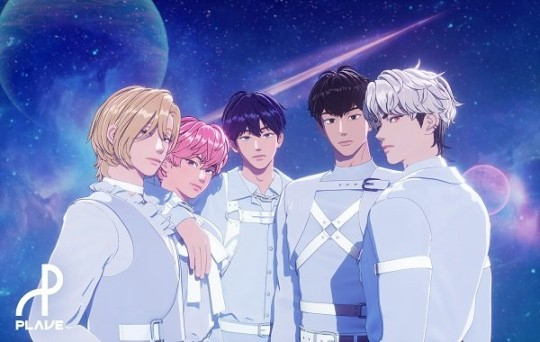Virtual idols open up new possibilities for K-pop
Technology blurs line between fantasy and reality, creating charming, highly-skilled artists in the virtual world
By Lee Jung-younPublished : Jan. 3, 2024 - 15:43

As K-pop continues to reach new heights, with groups and soloists alike enjoying ever-expanding global success, recent trends have shown that K-pop stars don't necessarily have to be human to attract a following.
A new boy band recently topped the pre-voting list for the Rookie of the Year award at the recent Seoul Music Awards, and in a single week, sold more than 200,000 copies of its new album. While this may seem like the story of yet another rookie idol group making a successful start to its career, this band's story is unique. The group, known as Plave, is in fact a virtual idol group boasting flawless visuals and charming vocals.
The five-member group, which debuted in March 2023, is attractive, sings superbly and shows sincere affection toward its fans, just like any other K-pop group. Twice a week, the group communicates with fans through a YouTube channel that has about 530,000 subscribers.
The group has already released four albums since its debut.
"At first, the concept of a virtual idol was an unfamiliar one. However, it was interesting to see cartoon-like characters interacting as a group, establishing a relationship among members just like any other idol band. The twice-weekly show on the group's YouTube channel is also fun," said Lee Young-ha, a fan of Plave in her 30s.
Virtual idols can be largely divided into two groups, depending on whether there are real humans behind them or not. In one case, virtual singers are created using real humans who wear special suits. A virtual appearance is then applied using technology. In the other case, virtual singers are created solely through artificial intelligence, and there are no real humans behind the screen.
Plave belongs to the former case, in which technology is used to superimpose a virtual appearance on real people. All members participated in writing and composing the group's songs and have showcased their dancing skills, despite their virtual appearances.

Isegye Idol, a six-member virtual girl group produced by YouTuber Woowakgood, also has real humans working behind their virtual facades. The group’s third digital single, "Kidding," released in August 2023, ranked sixth on Melon Top 100 chart.
Meanwhile, Eternity and MAVE: are examples of virtual idol groups created solely with technology.
Eternity, an 11-member group created using artificial intelligence, debuted in March 2021. PULSE9, Eternity's producer, is one of the leading virtual human technology companies in the country. The company entered the virtual human business market in Japan by signing an agreement with Realize Innovations, a Japanese IT company under SoftBank Group, on Dec. 28.

MAVE:, a virtual girl group co-produced by Kakao Entertainment and Netmarble, is also gaining huge popularity.
The music video for the group's debut song, "Pandora," released in January 2023, garnered 27 million views in 11 months. MAVE: also became the first virtual idol group to appear on a music broadcast program in January 2023, expanding the reach of virtual idols. The group’s second album, "What's My Name," recorded more than 10 million views on YouTube within two weeks. Webtoons and web novels featuring the MAVE: members are also set to be launched this year.
While virtual idols have not yet become mainstream in K-pop and Korean culture, their presence is gradually expanding, with virtual idol fans consuming their content and supporting virtual bands just like any other K-pop fan.
"While some fans are curious about the actual members behind the screen, most fans do not try to separate the real human member from its virtual persona. Fans tend to just accept the members of such groups, understanding them as a combination of characters and real-life artists," said an official from Vlast, the company behind Plave.
"Plave aims to hold a solo concert this year, which will be broadcast to the audience in real-time through screens with the AI-based characters, while the actual members perform live on site," the company added.

Technologies capable of creating virtual idols that act more naturally are rapidly developing.
In September, game publisher Netmarble -- which created MAVE: -- signed an agreement with Korean AI startup Upstage to jointly develop Persona AI. Persona AI is an artificial intelligence technology that builds up the specific characters of virtual humans, allowing for a more natural communication and appearance. With the advancement of the Persona AI function, MAVE: members will be able to remember past conversations and carry out conversations reflecting each member's unique identity and habits.
Lee, a fan of Plave, explained that virtual idols have an advantage over real idols. "Flawless appearances that cannot be found in real humans will be a powerful advantage only if companies solve the ‘uncanny valley’ problem." The uncanny valley problem refers to a feeling of discomfort aroused by the eerie similarity between humans and virtual beings.
“As artists that transcend reality, I think (virtual idols) can produce more surprising and dramatic content. Dangerous stage designs or fantasy-like backgrounds that are not feasible for humans are possible for virtual idols,” said Kim Sae-young, a fan of Isegye Idol who studies AI technology.
“Technology will develop, so the awkwardness or discomfort people feel about virtual idols will be resolved. Someday, they may become mainstream in the K-pop market,” added Kim.
-
Articles by Lee Jung-youn







![[Weekender] How DDP emerged as an icon of Seoul](http://res.heraldm.com/phpwas/restmb_idxmake.php?idx=644&simg=/content/image/2024/04/25/20240425050915_0.jpg&u=)



![[KH Explains] No more 'Michael' at Kakao Games](http://res.heraldm.com/phpwas/restmb_idxmake.php?idx=644&simg=/content/image/2024/04/28/20240428050183_0.jpg&u=20240428180321)







![[Herald Interview] Mistakes turn into blessings in street performance, director says](http://res.heraldm.com/phpwas/restmb_idxmake.php?idx=652&simg=/content/image/2024/04/28/20240428050150_0.jpg&u=20240428174656)
